| Construction Rating: | starstarstarstarstar |
| Flight Rating: | starstarstarstarstar |
| Overall Rating: | starstarstarstarstar |
| Manufacturer: | Rokitflite |
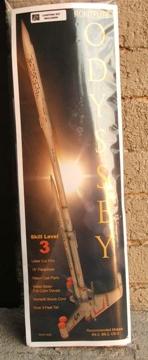 Brief:
Brief:
The Odyssey is the result of one man's journey to create his ultimate
"Deep Space" rocket. Scott Branche (Rokitflite on The Rocketry Forum
and Ye Olde Rocket Forum,) took it upon himself to fill a what he saw as a void
in the market, and based on the beta test kit I built and flew, I think he
nailed it. Hard. With lines and details that hearken back to what I consider
the glory days of Estes rocketry, the Odyssey is a true throwback kit, and an
enjoyable build to boot.
Construction:
The kit included:
- A. 1 - Instruction CD
- B. 2 - 13 ½” sections of BT-20 (main body assembly) tube
- C. 1 - 1 ½” BT-20 coupler
- D. 1 - 1” section of BT-50 (bulkhead) tube
- E. 6 - 20-50 centering rings
- F. 1 - 18” length of Kevlar® cord
- G. 1 - 18” length of elastic cord
- H. 1 - Paper shroud sheet
- I. 1 - 6” section of BT-50 (propulsion section) tube
- J. 1 - Tube marking guide sheet, fin guide sheet and fin alignment guide
- K. 1 - Laser-cut balsa parts bag
- L. 1 - Resin parts bag
- M. 1 – 1 1/8” section of BT-5 (sensor pod housing) tube
- N. 4 - 2” sections of BT-50 (main drive engines) tube
- O. 1 - Motor mount parts bag
- P. 3 - Craft sticks for glue application
- Q. 1 - 7” section of BT-50 (crew section) tube
- R. 1 - 17” section of BT-5 (fuel tank) tube
- S. 1 - 1 ½” section of BT-80 (mechanism ring) tube
- T. 1 - 18” parachute kit
- U. 1 - BT-50 plastic nose cone (color may vary)
- V. 1 - BT-50 plastic nose cone base
- W. 2 - 1” launch lugs
- X. Assorted plastic detail parts (.040” X 4” x 6” styrene sheet not shown)
- Y. 1 - Water-slide decal sheet
First of all, the instructions for the Odyssey come on a CD, and I can’t imagine anyone topping them for completeness and attention to detail. There are plenty of pictures and text that explain things down to the most minute detail. With guidance like this, someone who has only a couple of simple kits under their belt could conceivably put this kit together without breaking much of a sweat.
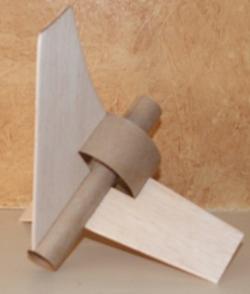 My initial
impression of the kit upon opening the bag was that it was going to be
over-the-top complicated. It arrived on a Friday, but all I had the nerve to do
was open it and try to get a feel for the project ahead. It just so happened
that a passing life squad woke me on Saturday morning at 5:00am, and the minute
I opened my eyes I knew I wasn’t going to get back to sleep. I went
downstairs to catch Sportscenter, but after switching on the TV, found myself
drawn to the dining room table where the Odyssey was sitting. “Let’s
build, big guy,” she seemed to say to me, “But go brush your teeth
first.”
My initial
impression of the kit upon opening the bag was that it was going to be
over-the-top complicated. It arrived on a Friday, but all I had the nerve to do
was open it and try to get a feel for the project ahead. It just so happened
that a passing life squad woke me on Saturday morning at 5:00am, and the minute
I opened my eyes I knew I wasn’t going to get back to sleep. I went
downstairs to catch Sportscenter, but after switching on the TV, found myself
drawn to the dining room table where the Odyssey was sitting. “Let’s
build, big guy,” she seemed to say to me, “But go brush your teeth
first.”
By the time my wife woke up a couple of hours later I had already had the Odyssey out on the front porch for a dry-fit photo session. Since it’s extremely difficult for me to build at my computer, I had copied the instructions from the CD and had worked my way through step fifteen. I was shocked at the ease with which the Odyssey went together to this point. Despite the intimidating looks, the kit went together with an ease that almost made the build feel instinctive.
Don’t be fooled. It’s not. This kit has enough small details that it makes it worth your while to use a set of the printed instructions as a checklist. Trust me on this. Following the instructions to the letter will result in a much better looking rocket than you'd wind up with if you were to "wing it".
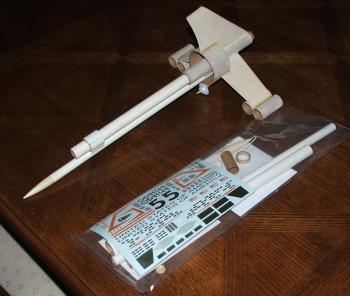 The only thing I
might be tempted to add to the instructions is a tip. When you're starting the
assembly of the main body parts, the centering rings will fit easier if you
peel a thin layer of paper from the inner diameter of the tube. They slide on
easier, and you'll be less likely to bend or crease a tube while trying to get
them to slide.
The only thing I
might be tempted to add to the instructions is a tip. When you're starting the
assembly of the main body parts, the centering rings will fit easier if you
peel a thin layer of paper from the inner diameter of the tube. They slide on
easier, and you'll be less likely to bend or crease a tube while trying to get
them to slide.
Another interesting feature of the Odyssey is the amount of detail that you can add once the overall construction is complete. Scott includes a sprue full of plastic detail pieces and varying shapes and sizes of sheet styrene. These allow you to customize the rocket to whatever level your heart desires. I think my Odyssey falls somewhere in the middle as far as the amount of customizing, but I've been known to be somewhat conservative when it comes to customizing and detailing due to a couple of horrible experiences in my gearhead days. (A hood scoop on a Dodge Charger made out of a shoe box and some fiberglass that looked like a giant pile of bird leavings and a Pinto wagon with a spoiler hand carved out of a 2 x 4. No, these weren't my projects.) While these haunt me to this day, they shouldn't keep you from going to town on your birds. Party on!
Finishing:
Finishing is a challenge because of the rockets many angles and hard to paint
places. (Like inside the large rear tube, between and inside the ram tubes, and
in the nooks and crannies of the detail pieces.) I countered this by doing as
much of the sealing and sanding of the tubes and balsa before assembly. This is
slightly difficult because of the large rear ring which I found was most easily
finished with as little sealer on the spirals as possible and a light sanding
touch.
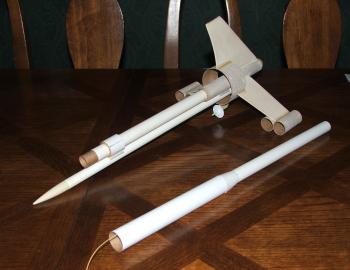 Another area where
one might encounter a problem is with the paper transition that connects the
forward parachute tube with the main body tube. I used a thin coat of gel CA to
connect the ends of the transition, then glued it into place with plain white
glue. When the glue had thoroughly dried, I coated the whole transition with
thin CA to beef it up for the sanding to come. I then covered the transition
area, including both seams where the transition attached to the body, with
thinned Fill & Finish, then sanded the area until smooth. This was not a
one coat job as it took three before I arrived at a finish that I could live
with and that I felt did the rocket justice. From this point the finishing
process is like most other rockets, so I’ll spare the details except to
say "seal, sand, repeat".
Another area where
one might encounter a problem is with the paper transition that connects the
forward parachute tube with the main body tube. I used a thin coat of gel CA to
connect the ends of the transition, then glued it into place with plain white
glue. When the glue had thoroughly dried, I coated the whole transition with
thin CA to beef it up for the sanding to come. I then covered the transition
area, including both seams where the transition attached to the body, with
thinned Fill & Finish, then sanded the area until smooth. This was not a
one coat job as it took three before I arrived at a finish that I could live
with and that I felt did the rocket justice. From this point the finishing
process is like most other rockets, so I’ll spare the details except to
say "seal, sand, repeat".
When painting the Odyssey, I used a darker grey than was shown on the pictures, but that may have been the one thing I'd change if I coul do it over. The decals have more of a "pop" on the lighter painted models. Mine looks fine, but I'd opt for a lighter grey. (I even toyed with the idea of silver.)
Scott went out and bought himself an Alps printer for this project and the decals that he turned out are a work of art in themselves. The set that came with my kit looked perfect to me, but Scott had noticed a thin white outline that he found distracting, so he sent another set. I used this to my advantage and my Odyssey is the only one in the galaxy with a #55 instead of #5. The decals apply nicely, but care must be taken with some of the larger ones as they can be somewhat difficult to apply without bubbles or tears. (There's a very good chance that this is more a patience issue than a decal issue. I'm notoriously impatient when it comes to decaling my birds.) When all is said and done, the Odyssey turns out looking exactly like what it set out to be; a fine choice to be the flagship of your fleet.
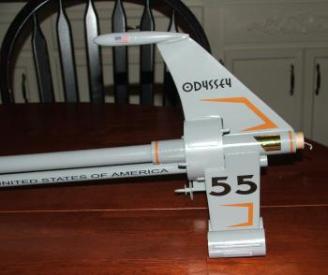
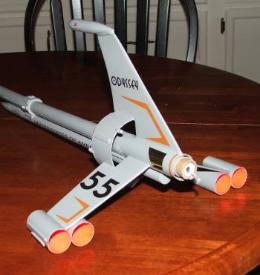
Construction Rating: 5 out of 5
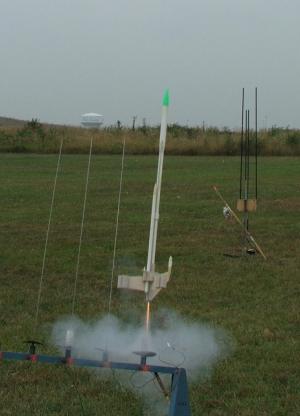 Flight:
Flight:
Home sale fun and games kept me from attending a launch and flying the Odyssey
for a while, but I finally got the chance to get it airborne on the last day of
NARAM 47 at the VOA north of Cincinnati. With most of the regular fliers
seemingly taking the day off from sport flying to watch the PMC and scale
flying on the contest range, I found myself able to take some time for my own
flights.
I had brought the Odyssey on Thursday and had gone as far as to install the prepped engine before realizing that I had FORGOTTEN THE LAUNCH LUGS. I tried to sneak off the field, but the rocket had already started to draw attention, especially since I had obviously meant to fly it. In the end I had to admit that I had forgotten to attach the lugs, which elicited several “Oh, yeah. I do that all the time.” Comments from the others on the sport range. With no time to get the lugs securely attached before leaving for a NARAM errand that I had agreed to run, I decided to wait until Friday to “debut” the Odyssey.
Friday was just ugly. Although the heat had broken somewhat, the overcast skies and low cloud deck combined with the sparse crowds to make for a somewhat depressing day on the sport range. I hadn’t checked the recommended engines closely and chose a B6-4 for the first flight. (Scott recommends B6-2s and C6-3s.) The flight, though not high, arced nicely into the breeze and over the veggies. The rocket tipped over at apogee and ejection came without incident a moment later. The breeze then brought it back to within 100 feet of the pad. I was pumped.
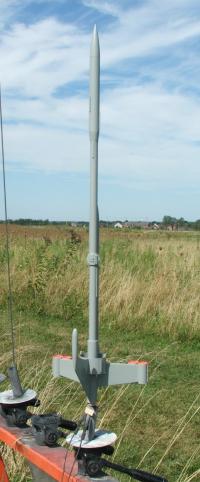 The success of the
first flight made the idea of a second flight appealing, especially since I had
filmed the entire flight as a jpeg and didn’t get a launch photo. I
decided that flight #2 would be on a C6-5 and expected a near carbon copy of
the first flight except for the added height. The added height was noticeable
and the Odyssey tipped over much as it had on the previous flight, but when the
ejection charge fired the nose cone drooped off to the side while the main body
tube appeared to bulge, then bend. From that point all that was left was to
watch the slow, painful death of the rocket as it nosed deep into the weeds.
When I arrived at the scene, what I found was what I expected, to a point. The
whole forward section of the rocket had folded itself up and the main tube was
breeched in two places. One was obviously from the impact. The other was also
obvious because of what looked to be ejection particles on the outside of the
body tube. (To be fair, I had cre ased the tube lightly while sanding the
spirals, but I coated the area with thin CA. By the same note of fairness, the
coated area was between the impact hole and the ejection charge hole.)
The success of the
first flight made the idea of a second flight appealing, especially since I had
filmed the entire flight as a jpeg and didn’t get a launch photo. I
decided that flight #2 would be on a C6-5 and expected a near carbon copy of
the first flight except for the added height. The added height was noticeable
and the Odyssey tipped over much as it had on the previous flight, but when the
ejection charge fired the nose cone drooped off to the side while the main body
tube appeared to bulge, then bend. From that point all that was left was to
watch the slow, painful death of the rocket as it nosed deep into the weeds.
When I arrived at the scene, what I found was what I expected, to a point. The
whole forward section of the rocket had folded itself up and the main tube was
breeched in two places. One was obviously from the impact. The other was also
obvious because of what looked to be ejection particles on the outside of the
body tube. (To be fair, I had cre ased the tube lightly while sanding the
spirals, but I coated the area with thin CA. By the same note of fairness, the
coated area was between the impact hole and the ejection charge hole.)
This happened on a Friday, and I told Scott about it that night. Since the Odyssey was still unpainted, he sent me replacement parts so that I could finish it properly. As I said, it was Friday night when I informed him of the crash. The parts arrived on Monday. I was impressed.
Repairs went quickly and I had everything primed and ready for paint by the end of the week, but on Friday night I broke my ankle playing cards. Hobbling around for the week threw my rocket building plans onto the back burner, but when the following weekend rolled around, I was getting around well enough to consider going to that weekend's Quark section launch. This time I brought along one of the correct motors, just to see how things went when done as Scott planned them. The Odyssey's first flight was on its "death motor", an Estes C6-5. The flight was once again impressive, plenty high and arcing into the wind. At apogee it again tipped over and beginning to head back to earth. This was where I realized why Scott had specified a C6-3 as the lines fouled on the rear sail, allowing the parachute to only partially open. It headed back toward the flight line and looked as if it was going to roger the line of trucks in the parking area, but one of the Burning Berry Broth er snatched it from the air before it could re-kit itself.
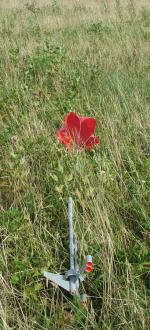 After untangling the
lines, it was ready for another flight, this one on a B6-2. The B6-2 flight was
a whole different kind of terror as the Odyssey seemed to have to fight its way
off the rod. The ejection charge was timed perfectly, but once again the breeze
took it back toward the flight line. This time there was no close call as the
rocket landed safely in the weeds across the access road, but the lack of
height leads me to believe that the C6-3 is going to be the perfect engine for
this rocket. (Gee, just like Scott suggested. Who knew?)
After untangling the
lines, it was ready for another flight, this one on a B6-2. The B6-2 flight was
a whole different kind of terror as the Odyssey seemed to have to fight its way
off the rod. The ejection charge was timed perfectly, but once again the breeze
took it back toward the flight line. This time there was no close call as the
rocket landed safely in the weeds across the access road, but the lack of
height leads me to believe that the C6-3 is going to be the perfect engine for
this rocket. (Gee, just like Scott suggested. Who knew?)
Flight Rating: 5 out of 5
Summary:
Even before I built the Odyssey, I liked the looks of the rocket because of the
way Scott had gone about melding the influences of a number of classic kits
into what is in my opinion a new classic. Building and flying the rocket only
served to reinforce my opinions. This is a very cool rocket just as is, but
with the customizing kit that is included, it's possible to make the Odyssey
uniquely yours with as much, or as little, detail as you want. Scott has
mentioned that he's working on another kit, and based on the Odyssey, I find
myself greatly looking forward to the sister kit's debut.
Overall Rating: 5 out of 5
Other Reviews
- Rokitflite USS Odyssey By Jim Filler (November 6, 2008)
Brief: Deep Space Fantasy Model. It has the flavor of an early 70's transport sci-fi ship. Construction: The model has numerous parts starting out with 4 main sections of body tube going from BT-50 to BT-20 to BT-5. Balsa fins have plastic overlays to add texture and are connected to the main tube and scalloped to also attach to a piece of BT-80 that gives the appearance of a ...
- Rokitflite USS Odyssey By Charlaine Cadence Nordin (December 11, 2007)
Brief: Classic science fiction-based low powered design. Highly detailed and fully customizable. A rocket that allow the builder's imagination soar long after the build is complete. Construction: Looking at the parts, you first are overwhelmed and worried about the build. instruction CD for use with computer 11 tubes 6 centering rings 1 motor block and ...
- Rokitflite USS Odyssey By Bob Harrington
Brief: This is a Deep Space Fantasy rocket that brings back memories of the Andromeda, USS Atlantis, Solar Sailer, etc. It uses standard 18mm motors with parachute recovery. Construction: This is a builders kit and the number of components is extensive. 2 BT-20 tubes 7 BT-50 tubes 2 BT-5 tubes 1 BT-80 tube 1 BT-20 coupler 6 20-50 centering rings 1 Kevlar ...
 |
 |
Flights
 |
 |